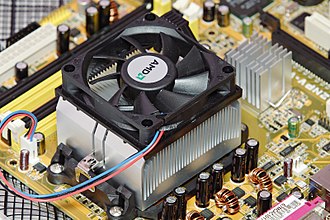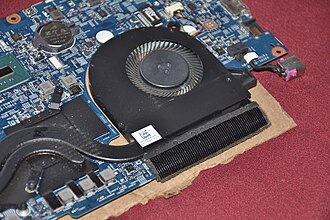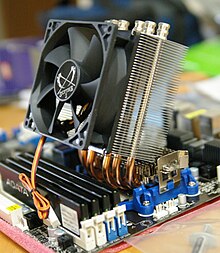
Back مشتت حراري Arabic Hladnjak BS Dissipador tèrmic Catalan ھێت سینک CKB Chladič Czech Køleplade Danish Kühlkörper German Disipador Spanish گرماگیر FA Jäähdytyselementti Finnish



A heat sink (also commonly spelled heatsink,[1]) is a passive heat exchanger that transfers the heat generated by an electronic or a mechanical device to a fluid medium, often air or a liquid coolant, where it is dissipated away from the device, thereby allowing regulation of the device's temperature. In computers, heat sinks are used to cool CPUs, GPUs, and some chipsets and RAM modules. Heat sinks are used with other high-power semiconductor devices such as power transistors and optoelectronics such as lasers and light-emitting diodes (LEDs), where the heat dissipation ability of the component itself is insufficient to moderate its temperature.
A heat sink is designed to maximize its surface area in contact with the cooling medium surrounding it, such as the air. Air velocity, choice of material, protrusion design and surface treatment are factors that affect the performance of a heat sink. Heat sink attachment methods and thermal interface materials also affect the die temperature of the integrated circuit. Thermal adhesive or thermal paste improve the heat sink's performance by filling air gaps between the heat sink and the heat spreader on the device. A heat sink is usually made out of a material with a high thermal conductivity, such as aluminium or copper.
- ^ "Heatsink". Wiktionary. 3 November 2020. Retrieved 2022-12-14.